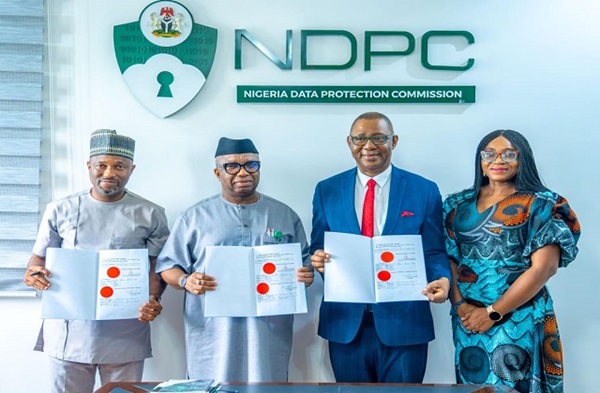
In a bold step to embed a robust culture of data privacy and responsible digital citizenship in Nigeria’s educational system, Digital Africa Global Consult (DAGC), a trailblazing technology advancement firm, has entered into a strategic partnership with the Nigeria Data Protection Commission (NDPC).
The landmark collaboration was formalised on Friday with the signing of a memorandum of understanding (MoU), marking the official launch of the Nigeria Data Challenge, a first-of-its-kind national programme designed to foster data protection literacy among secondary school students nationwide.
Unlike conventional awareness campaigns, the Nigeria Data Challenge is a dynamic, competitive learning platform tailored to engage students through curriculum-aligned modules, hands-on challenges, and knowledge assessments. Its primary aim is to nurture a generation that is not only aware of their data rights and responsibilities but is also equipped to navigate and thrive in an increasingly data-driven world.
Speaking at the MoU signing ceremony, national commissioner of the NDPC, Dr. Vincent Olatunji hailed Digital Africa Global Consult for spearheading the innovative initiative. He described the challenge as timely and transformative, dovetailing with the commission’s ongoing Privacy Club Initiative already active in Nigeria’s tertiary institutions.
“This partnership is an extension of our strategic mission to entrench a data protection-conscious culture in Nigeria. By catching them young, we are sowing seeds for a safer digital environment. The Nigeria Data Challenge will become a vital pillar in our broader national awareness campaign,” Olatunji stated.
In his remarks, chairman of Digital Africa Global Consult and a long-standing champion of Africa’s digital transformation, Dr. Evans Woherem underscored the strategic relevance of data literacy in the 21st-century economy.
“Data is today’s ‘new oil’, but unlike crude oil, its value lies in how well it is managed and protected. The youth must understand this from the earliest stages of their digital lives. The Nigeria Data Challenge will prepare them to become responsible custodians of data in a world where data misuse can have far-reaching consequences,” Woherem emphasised.
Adding perspective, general manager of Digital Africa Global Consult, Nneoma Ofodile noted the initiative’s global significance, calling it a precedent-setting programme.
“This is not just a national milestone but a global first. No other country has launched a structured, school-based data challenge of this scale. It aligns perfectly with Sustainable Development Goals (SDGs) 4 (Quality Education), 9 (Industry, Innovation and Infrastructure) and 16 (Peace, Justice and Strong Institutions). It’s a step towards building resilient institutions starting from our classrooms,” she explained.
Ofodile further stressed the urgency of tackling reckless data sharing among the youth, pointing out that many students unknowingly compromise their privacy online daily.
“Today’s students often become both victims and unwitting enablers of data breaches through careless online behaviour. Awareness cannot be optional anymore; it is an essential life skill in the digital age,” she added.
Nigeria’s rapid digital transformation — spanning fintech, e-commerce, telemedicine, AI and smart governance — has amplified the need for strong data governance and protection frameworks. The establishment of the NDPC in 2023 aligned Nigeria with global data protection standards, echoing frameworks like the European Union’s GDPR and similar laws in Kenya, South Africa and Rwanda.
However, experts agree that effective regulation must be matched with widespread public literacy, especially among the young population who form the bulk of Nigeria’s digital citizens.
The Nigeria Data Challenge is designed to scale through state-level eliminations, regional contests, and a prestigious national championship where top schools and students will be celebrated for their mastery of data ethics and privacy principles.
According to the organisers, the project aims to spark a ripple effect, encouraging more public-private collaborations and embedding data literacy as a key pillar of civic education in Nigeria.
At a time when Nigeria’s digital economy is projected to account for an even larger share of GDP, stakeholders say initiatives like this will help mitigate risks such as identity theft, fraud and data misuse, which have become common pitfalls in the digital era.
Olatunji concluded by expressing confidence that the partnership will not only strengthen data privacy awareness but also inspire similar efforts across Africa.
“As we champion responsible data practices from our schools upward, we are building a foundation for a resilient and secure digital economy. We invite other stakeholders to join us in shaping a privacy-conscious future for Nigeria,” he said.
With this pioneering challenge, Nigeria may well set the standard for grassroots data governance education on the continent and beyond, ensuring that its young citizens are prepared to lead in an increasingly interconnected world where data is currency and privacy is power.


